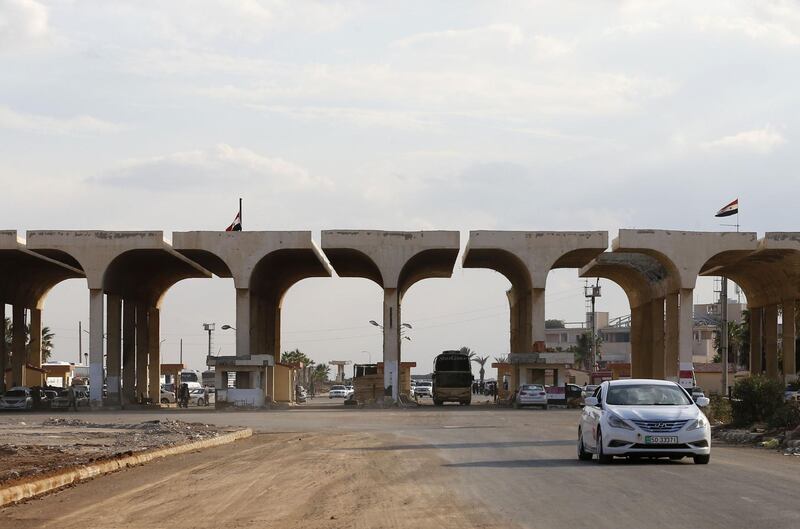Jordanians are sounding caution about venturing into Syria through the recently reopened Nassib border crossing after one person was detained for almost two weeks and two others went missing.
Authorities on Tuesday released Jordanian citizen Yacoub Youssef Suleiman Al Aqrabawi, who was arrested at the crossing on November 1, the Jordanian Foreign Ministry told The National.
Mr Al Aqrabawi's detention, as well as the disappearance of two other Jordanians who crossed into Syria at Nassib, had prompted Jordanian citizens and officials such as parliamentarian Saleh Armouti to caution against travel to Syria.
However, a source from the media department at the foreign ministry said Mr Al Aqrabawi had been arrested due to a “private issue” linked to an “Interpol warrant issued by the UAE,” and not because of political or security problems with the Syrian government.
The Jordanian embassies in Damascus and in Abu Dhabi worked on securing his release, said the source, who was not allowed to disclose details of the complaint lodged by the UAE.
_______________
Read more:
At Syria border, Jordanians dash over for cheap shopping
Beyond the Headlines podcast: Syria-Jordan border restoration opens up many opportunities
Syrian families reunited as Jordan border crossing reopens
Syrians trapped inside Rukban did not receive aid from UN
_______________
“The case had been previously settled in the Emirates but the Syrian authorities were not aware of this," he said. “The issue was purely procedural. Once the proper documentation was provided, they let him go."
Mr Al Aqrabawi, in his late 20s, has now returned to Jordan. His mother, who had written a heartfelt message on Facebook on the day of his disappearance, did not respond to requests for comment from The National.
Two other Jordanians from the border town of Ramtha remain missing after recently entering Syria through Nassib. Earlier this week, their relatives asked for help from local authorities after losing contacting with them, the source from the foreign ministry told The National.
It remains unclear as to whether the men were arrested or not. “We contacted the Syrian authorities and we are waiting for a response," said the source.
The Syrian Network for Human Rights (SNHR), an activist-run monitoring group, says the two men have been arrested by the Syrian government.
The SNHR says that the arrest of Jordanians at Nassib stems from “security reasons”, not personal issues.
“That means that they were arrested because they were active in helping Syrian refugees in Jordan or someone close to the regime reported them to Syrian authorities,” explained Nour Al Khatib, a member of the group. Families do not wish to communicate their names out of fear of retaliation from the Syrian regime, she said.
For the Syrian government, which has gained the upper hand in the 8-year-long conflict, the reopening of Nassib on October 15 after a three-year hiatus represents an essential step towards normalisation of relations with Jordan, an important business partner, and the region.
Tens of thousands of Jordanians have flocked to Syria, eager to buy cheap Syrian goods. Jordanian tour packages to Damascus have started operating again.
But these incidents pose a potential hiccup in the full restoration of ties between the two countries.
Attempts by the Jordanian authorities to downplay Mr Al Aqrabawi’s arrest did not temper fears among some Jordanians who are looking for confirmation that security has returned to Syria and that Jordanian citizens will not be targeted in retribution for Amman’s refusal to firmly stand with Damascus during the war.
“The deals are good and we all know Damascus. But the real question is: is it safe?” wonders Walid Hassan, a 70-year-old Jordanian considering a holiday offer in Syria.
The concern also has roots in history. Many Jordanians, particularly those of Palestinian origin, have stories of a relative or a friend who disappeared in Syria prior to the war, only to re-emerge years later, or in some cases not at all.
Adam Coogle, a Middle East researcher at Human Rights Watch, said detainees in Syria were at risk of torture or ill-treatment. "Over the years Human Rights Watch has documented widespread torture, starvation, beatings and disease in Syrian government detention facilities," he told The National.
Complicating matters was the release of a list of names of nearly 9,000 Jordanians by a Syrian opposition website claiming that they were wanted by Syrian authorities.
Following the news of Mr Al Aqrabawi’s arrest, Syrian opposition site Zaman Al Wasl, which claims to have obtained the archives of the Syrian intelligence in 2015, released the list of 8,845 arrest warrants for Jordanians dating back decades.
The Syrian embassy in Amman has denied the existence of a blacklist of Jordanians, calling the reports a “pack of lies”.





